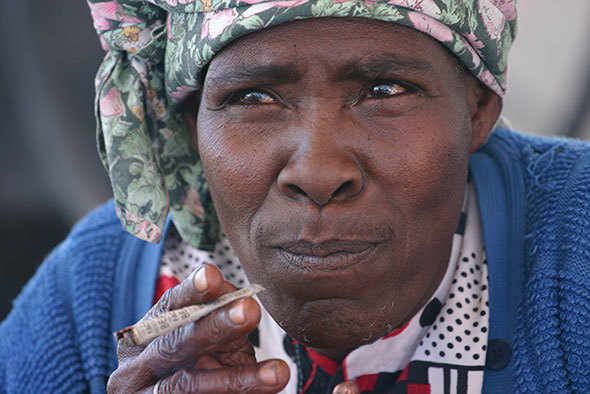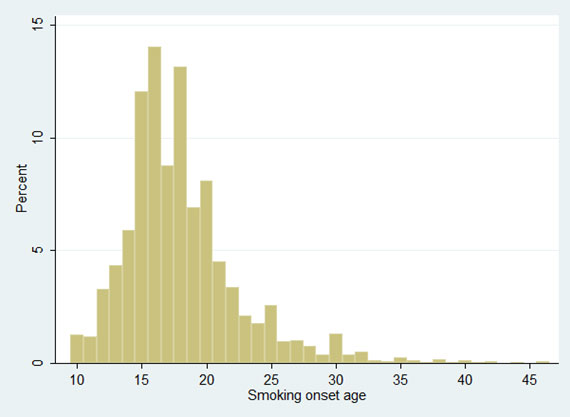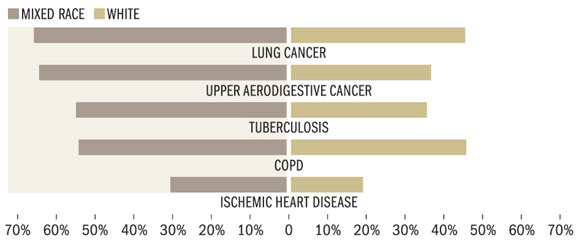Cigarette taxes lead to big drop in smoking
24 May 2015 | Story by Newsroom
Smoking in South Africa has decreased substantially over the past two decades, particularly among the young and the poor – and research shows that this is largely thanks to sharp hikes in excise taxes, which have pushed up the price of the average pack of cigarettes.
The cost has induced some smokers to give up, encouraged others to cut down on the number of cigarettes they smoke, and helped to persuade people not to start in the first place.
It's a scenario that has been extensively researched by the highly-respected Economics of Tobacco Control Project, based at the School of Economics.
Since the government introduced the policy of raising excise tax on tobacco products in 1994, mainly for public health purposes, aggregate cigarette consumption has fallen by more than a third, per capita consumption has fallen by more than half, and smoking prevalence among adults (aged 15 and over) has decreased from about 33% to less than 20%.
"This is impressive in anyone's language. We see that smoking prevalence has decreased most among the poor and the young – the two groups most sensitive to changes in the price of cigarettes," says project director Professor Corné van Walbeek.
Excise tax currently stands at R12.45 per pack of cigarettes. An average pack of 20 retails for around R30, although Van Walbeek says there is something of a price war going on currently, due partly to an influx of cheap cigarettes into South Africa from importers wanting to take advantage of the profitable cigarette market. British American Tobacco (BAT) is the dominant cigarette producer in South Africa, and has been the price leader for many years. Despite the frequent tax increases and decreasing sales volumes, the profit per stick has grown enormously – to the extent that BAT is now more profitable than it was 20 years ago. In order to fight cheap competitors, BAT has slashed the prices of some of their prominent brands (Rothmans and Pall Mall) to between R20 and R23 per pack. Even the price of Peter Stuyvesant, its most important brand, has been reduced in the past year.
With about half of regular lifelong smokers dying of a tobacco-related disease, any reduction in the number of smokers is encouraging. But as Van Walbeek says, policy needs to be evidence-based.
The Project is proving its worth with a range of academic studies that could have impacts on policy across sub-Saharan Africa. Members have already advised government officials on tobacco excise-tax policy in a number of African countries, ranging from Ghana and Namibia to Botswana.
UCT master's graduate Nicole Vellios is one of the Project researchers whose work could feed into policy decisions in future. She poses a fairly simple question in her research: what are the determinants of smoking initiation? – that is, why do people start smoking? Up until now, research into this issue has been dominated by studies in high-income countries.
Vellios has found that the price of cigarettes has a definite impact on males starting to smoke. A ten-rand increase in the price of cigarettes reduces the probability of men starting to smoke by 10.7% to 15.4%.
The price of cigarettes does not significantly affect smoking initiation for females; while Vellios did not extract the reasons in her research, she says this may be because girls or teenagers are often given their first cigarette by someone such as a boyfriend, brother or friend.
The results also show that people are more likely to start smoking if their parents smoke, while children of parents with limited education are more likely to start smoking than children of parents with more education.
"Education levels in South Africa are improving gradually over time; and should the trends found in this paper continue, this should lead gradually to reduced smoking initiation in the next generation," says Vellios.
Living in an urban area increases the probability of smoking for both males and females.
Females are more likely than males to start smoking if their mothers die before they (the daughters) turn 15. This is seen as an indication of family turmoil. For boys, smoking initiation is not affected by their mothers dying before they turn 15.
 Eighty percent of smokers start by the age of 20 – which makes focusing on young people so important. (Source: NIDS 2008 DATA)
Eighty percent of smokers start by the age of 20 – which makes focusing on young people so important. (Source: NIDS 2008 DATA)
The average age at which South Africans start smoking differs slightly according to race. While there are substantial spikes at ages 16 and 18, the average age peaks at 17 years for White and Asian males, and at 17.2 years for Coloured males. Smoking initiation is substantially lower among African males – and peaks later, at around 18.5 years.
The average age at which girls or women start smoking is 16.8 years for Coloured females, 18.1 years for African females and 18.3 years for Whites and Asians.
The statistics reveal that Coloured South Africans smoke more than any other race in South Africa.
 Percentage of smoking-related deaths in Coloured (mixed-race) and White men aged 35-74 in South Africa: 1999-2007. Tobacco-related deaths are more common in people with lower socioeconomic status. (Source: The Tobacco Atlas)
Percentage of smoking-related deaths in Coloured (mixed-race) and White men aged 35-74 in South Africa: 1999-2007. Tobacco-related deaths are more common in people with lower socioeconomic status. (Source: The Tobacco Atlas)
Van Walbeek says that excise-tax increases have been successful in curbing smoking, as cigarette manufacturers have generally passed the increase onto consumers in the form of higher prices. In many cases they have even overshifted the taxes. "When the tax increases by 50 cents a pack, the industry has increased the price by substantially more than 50 cents," he remarks.
The real price of cigarettes has increased by 189% in 18 years – from R7.24 in 1994, to R20.93 in 2012. Economists use the term 'real price' to refer to the price of a product once the impact of inflation has been eliminated.
Other tobacco-control measures have been introduced alongside an increase in excise tax. In South Africa, cracking down on smoking in public places, stringent packaging requirements, and the banning of advertising, promotion and sponsorships has also helped to stub out smoking.
"It's been a rewarding field to work in," says Vellios. "I hope the research will make an impact, and will benefit people and public health in South Africa."
The Project is also hoping to make more inroads into tobacco-control strategies elsewhere in Africa. While smoking prevalence is still low in many African countries, it is rising rapidly; as smoking rates have subsided in the US and many other countries in the developed world, the tobacco industry has intensified its marketing on the African continent.
"These countries can avoid most of the tobacco epidemic if they impose strong policies that include high and rising excise taxes. Many countries have poor excise-tax structures, and often these poor structures are exploited by the tobacco industry, to their own advantage," says Van Walbeek.
He's hoping his committed group of researchers will boost knowledge about tobacco control and help to strengthen support for tobacco-tax and -price increases in sub-Saharan Africa.
The Economics of Tobacco Control Project works in partnership with the Bill & Melinda Gates Foundation, the American Cancer Society and the African Capacity Building Foundation.
Story by Kim Cloete. Main image by Luca Galuzzi, Wikimedia Commons.
 This work is licensed under a Creative Commons Attribution-NoDerivatives 4.0 International License.
This work is licensed under a Creative Commons Attribution-NoDerivatives 4.0 International License.
Please view the republishing articles page for more information.










